
- Afghanistan
- Africa
- Budget Management
- Defense
- Economy
- Education
- Energy
- Environment
- Global Diplomacy
- Health Care
- Homeland Security
- Immigration
- International Trade
- Iraq
- Judicial Nominations
- Middle East
- National Security
- Veterans
|
Home >
News & Policies >
December 2006
|
For Immediate Release
Office of the Press Secretary
December 15, 2006
President Attends Armed Forces Full Honor Review for Secretary Rumsfeld
The Pentagon
1:50 P.M. EST
THE PRESIDENT: Thank you all. Thank you very much, Mr. Secretary and Joyce. Mr. Vice President, thank you for your kind words. Lynne and Senator Warner, Deputy Secretary England, Secretary Harvey, Winter, Wynne, General Pace, members of the Joint Chiefs of Staff, distinguished guests, men and women of the armed forces.
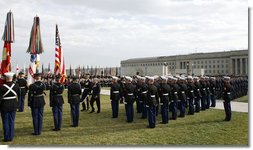 I'm pleased to join you as we pay tribute to one of America's most
skilled, energetic and dedicated public servants, the Secretary of
Defense, Donald Rumsfeld.
I'm pleased to join you as we pay tribute to one of America's most
skilled, energetic and dedicated public servants, the Secretary of
Defense, Donald Rumsfeld.
Don Rumsfeld has been at my side from the moment I took office. We've been through war together. We have shared some of the most challenging moments in our nation's history. Over the past six years, I have come to appreciate Don Rumsfeld's professionalism, his dedication, his strategic vision, his deep devotion to the men and women of our nation who wear the uniform, and his love for the United States of America.
That devotion began at an early age, inspired by a man in uniform he called "dad." His father, George, was 37 when America was attacked at Pearl Harbor. Too old to be drafted, he volunteered for service in the United States Navy. One of Don's earliest memories is of standing on the hangar deck of his dad's aircraft carrier, the USS Hollandia, at the age of 11. He was taking in the sights and sounds of the ship as it prepared to leave for the Pacific War.
His father's example stayed with him, and after graduating from Princeton, Don Rumsfeld joined the United States Navy, rising to become a pilot, a flight instructor and a member of the Naval Reserve for nearly 20 years.
In the decades since he first put on the uniform, Don Rumsfeld has served with distinction in many important positions: Congressman, Counselor to the President, Ambassador to NATO, White House Chief of Staff, Secretary of Defense. Yet, to this day, the title that has brought him his greatest pride is "dad," and now, "grandad." And so today, as we honor a fine man, we also honor his family, Joyce Rumsfeld and his children. (Applause.)
Don Rumsfeld is the only man to have served as Secretary of Defense for two Presidents in two different centuries. (Laughter.) In 2001, I called him back to the same job he held under President Gerald Ford, and I gave him this urgent mission: Prepare our nation's armed forces for the threats of a new century.
Don Rumsfeld brought vision and enthusiasm to this vital task. He understood that the peace of the post-Cold War years was really the calm before the next storm, and that America needed to prepare for the day when new enemies would attack our nation in unprecedented ways. That day came on a clear September morning. And in a moment of crisis, our nation saw Donald Rumsfeld's character and courage.
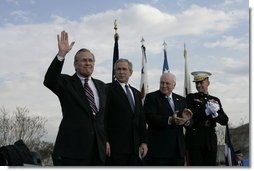 When the Pentagon was hit, Secretary Rumsfeld's first instinct was to
run toward danger. He raced down smoke-filled hallways to the crash
site, so he could help rescue workers pull the victims from the rubble.
And in the weeks that followed, he directed the effort to plan our
nation's military response to the deadliest terrorist attack in our
nation's history.
When the Pentagon was hit, Secretary Rumsfeld's first instinct was to
run toward danger. He raced down smoke-filled hallways to the crash
site, so he could help rescue workers pull the victims from the rubble.
And in the weeks that followed, he directed the effort to plan our
nation's military response to the deadliest terrorist attack in our
nation's history.
Under Secretary Rumsfeld's leadership, U.S. and coalition forces launched one of the most innovative military campaigns in the history of modern warfare, sending Special Operations forces into Afghanistan to link up with anti-Taliban fighters, to ride with them on horseback, and to launch a stunning assault against the enemy. In Operation Enduring Freedom we combined the most advanced laser-guided weapons with one of the oldest tools in the military arsenal -- a man with a weapon on a horse.
History will record that the first major ground battle in the 21st century involving American forces began with a cavalry charge. I guess that's what you get when you bring together a President from Texas with a Secretary of Defense who actually remembers when America had a cavalry. (Laughter and applause.)
In 2003, on my orders, Secretary Rumsfeld led the planning and execution of another historic military campaign, Operation Iraqi Freedom. In this operation, coalition forces drove Saddam Hussein from power in 21 days. And in the years that followed, Don Rumsfeld helped see the Iraqi people through the resumption of sovereignty, two elections, a referendum to approve the most progressive constitution in the Middle East, and the seating of a newly elected government.
On his watch, the United States military helped the Iraqi people establish a constitutional democracy in the heart of the Middle East, a watershed event in the story of freedom.
As he met the challenges of fighting a new and unfamiliar war, Don Rumsfeld kept his eyes on the horizon and on the threats that still await us as this new century unfolds.
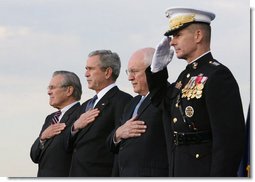 He developed a new defense strategy and a new command structure for our
nation's armed forces, with a new northern command to protect the
homeland, a new joint forces command to focus on transformation, a new
strategic command to defend against long range attacks, and a
transformed U.S. Special Operations command ready to take the lead in
the global war on terror.
He developed a new defense strategy and a new command structure for our
nation's armed forces, with a new northern command to protect the
homeland, a new joint forces command to focus on transformation, a new
strategic command to defend against long range attacks, and a
transformed U.S. Special Operations command ready to take the lead in
the global war on terror.
He launched the most significant transformation of the Army in a generation. He led my administration's efforts to transform the NATO Alliance, with a new NATO response force ready to deploy quickly anywhere in the world. On his watch, NATO sent its forces to defend a young democracy in Afghanistan, more than 3000 miles from Europe. It was the first time NATO has deployed outside the North Atlantic area in the history of the Alliance.
He helped launch the Proliferation Security Initiative, an unprecedented coalition of more than 80 nations working together to stop shipments of weapons of mass destruction on land, at sea and in the air.
He undertook the most sweeping transformation of America's global defense posture since the start of the Cold War, repositioning our forces so they can surge quickly to deal with unexpected threats, and setting the stage for our global military presence for the next 50 years.
He took ballistic missile defense from theory to reality. And because of his leadership, America now has an initial capability to track a ballistic missile headed for our country and destroy it before it harms our people.
Most importantly, he worked to establish a culture in the Pentagon that rewards innovation and intelligent risk taking, and encourages our military and civilian leaders to challenge established ways of thinking.
The record of Don Rumsfeld's tenure is clear. There have been more profound change -- there has been more profound change at the Department of Defense over the past six years than at any time since the Department's creation in the late 1940s. (Applause.)
And these changes were not easy, but because of Don Rumsfeld's determination and leadership, America has the best equipped, the best trained, and most experienced armed forces in the history of the world. All in all, not bad for a fellow who calls himself a "broken-down ex-Navy pilot." This man knows how to lead, and he did, and the country is better off for it. (Applause.)
In every decision Don Rumsfeld made over the past six years, he always put the troops first, and the troops in the field knew it. A few years ago, the editors at Time Magazine came to his Pentagon office, and Don correctly suspected they were thinking of naming him "Person of the Year." Without hesitation, Don Rumsfeld told them, don't give it to me. Give it to our men and women in uniform -- and that's exactly what Time Magazine did. (Applause.)
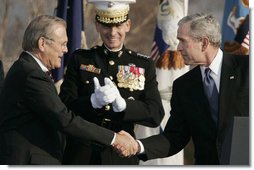 Don Rumsfeld's selfless leadership earned him the admiration of our
soldiers and sailors and airmen and Marines. And we saw how they feel
about him this week when he paid a farewell visit to our troops in Iraq.
Don Rumsfeld's selfless leadership earned him the admiration of our
soldiers and sailors and airmen and Marines. And we saw how they feel
about him this week when he paid a farewell visit to our troops in Iraq.
Don Rumsfeld's strong leadership has earned him my admiration and deep respect. We stood together in hours of decision that would affect the course of our history. We walked amid the rubble of the broken Pentagon the day after September the 11th, 2001. He was with me when we planned the liberation of Afghanistan. We were in the Oval Office together the day I gave the order to remove Saddam Hussein from power.
In these and countless other moments, I have seen Don Rumsfeld's character and his integrity. He always ensured I had the best possible advice, the opportunity to hear and weigh conflicting points of view. He spoke straight. It was easy to understand him. He has a sharp intellect, a steady demeanor, and boundless energy. He began every day at the Pentagon with a singular mission -- to serve his country and the men and women who defend her.
Mr. Secretary, today your country thanks you for six outstanding years at the Department of Defense. And I thank you for your sacrifice and your service and your devotion to the men and women of our armed forces.
I want to thank Joyce for her poise and her grace and for the example she has set for our nation's military families. Laura and I will miss you both, and we wish you all the best in the years to come.
And now, ladies and gentlemen, I bring to this podium America's 21st Secretary of Defense, Donald Rumsfeld. (Applause.)
SECRETARY RUMSFELD: Thank you very much. Thank you. Thank you so much.
Mr. President, Mr. Vice President, I thank you so much for joining us, and I thank you for those generous words, and for your support these many years.
Chairman Pace, thank you for your sound advice and for your unfailing good humor through enormously challenging times.
Deputy Secretary Gordon England, you've been a valued partner in this mission, and I thank you so much. You make a difference here every single day. Thank you, Gordon. (Applause.)
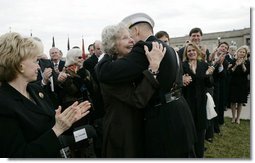 Service Secretaries, members of the Joint Chiefs of Staff, combatant
commanders -- I saw my friend, former Chairman General Dick Myers, down
here in the front row. Dick, it's always good to see you. Chairman
Warner, members of Congress, ladies and gentlemen, thank you all. And
all of those gathered, military and civilian, who make this great
Department what it is, thank you so much for what you do for our
country.
Service Secretaries, members of the Joint Chiefs of Staff, combatant
commanders -- I saw my friend, former Chairman General Dick Myers, down
here in the front row. Dick, it's always good to see you. Chairman
Warner, members of Congress, ladies and gentlemen, thank you all. And
all of those gathered, military and civilian, who make this great
Department what it is, thank you so much for what you do for our
country.
As I look back over these past six years and reflect on what's been achieved, I feel a sense of gratitude -- gratitude to Joyce, to be sure, and our three wonderful children and seven grandchildren, we have been together in this every minute; gratitude to the hundreds of thousands of people in this Department who, out of love of country, contribute so much; and gratitude to all those amazing young people who volunteer and step forward and proudly wear our nation's uniforms.
Last weekend I was in Iraq. I wanted to personally express my heartfelt appreciation to the troops for their service and for their sacrifice. I wanted to leave them a sense of what they have given me: pride in mission, and an abiding confidence in our country. It has been the highest honor of my life to serve with them, these makers of history.
Mr. President, over the past six years, at your request, as you pointed out, this Department has been determined to create a new framework to better defend against the irregular threats of this new era. These folks have had to depart from the conventional and the familiar, to wrestle with the new and the unfamiliar. And they do it with no guidebook, with no road map, and they do it in full view of the Congress and the press and the world, with generous scrutiny from all sides. (Laughter.)
Today I'll break with convention one more time, and instead of the traditional farewell remarks on past achievements, I will focus squarely on the future. I say this with the perspective of one, as the President indicated, who's had the opportunity to lead this Department in two different eras, in two different world conflicts, for two different Presidents -- and, yes, it's true, in two different centuries.
When I last departed this post in 1977, I left cautioning that weakness is provocative, that weakness inevitably entices aggressors into acts that they would otherwise avoid. Then, our country was engaged in a long struggle -- a struggle of uncertain duration against, what seemed at the time, as an ascendant ideology, and clearly an expanding empire.
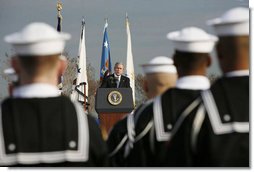 Few would have believed that 15 years later, the Soviet Union would
cease to exist, or that the dissidents then trapped behind the Iron
Curtain would lead people out of the dustbin of history and into the
family of free nations, which they did. That history did not happen by
accident. And it most assuredly was not made by people sitting safely
on the sidelines. It occurred only because America and our allies
withstood the tough times, the bitter disagreements, and they stayed at
the task with conviction that our security was linked to the defense and
the advance of human freedom.
Few would have believed that 15 years later, the Soviet Union would
cease to exist, or that the dissidents then trapped behind the Iron
Curtain would lead people out of the dustbin of history and into the
family of free nations, which they did. That history did not happen by
accident. And it most assuredly was not made by people sitting safely
on the sidelines. It occurred only because America and our allies
withstood the tough times, the bitter disagreements, and they stayed at
the task with conviction that our security was linked to the defense and
the advance of human freedom.
This is what history asks of us today. And as I leave the Pentagon for the second -- and I suspect the odds are, the last time -- (laughter) -- I do feel a sense of urgency about the very real challenges ahead. As the President noted seven years ago, he said, we're living in an era of barbarism emboldened by technology. We live a time when our enemies mix an extremist ideology with modern weaponry, and they have the ability to kill thousands, indeed even hundreds of thousands of our people in a single, swift, deadly stroke. We forget that at our peril.
A number of us came here in 2001 with that mission and mandate to prepare this defense establishment to protect the American people from the unconventional and the irregular threats. That mission was given powerful impetus that bright September morning when that mighty building just a few yards away shook, burned, and smoked -- and 125 members of our Pentagon team did not come home.
The attacks of September 11th awakened Americans to the global extremist movement; a movement with networks in nations all around the world, even our own; a movement with tens of thousands of adherents who believe it is their calling to kill Americans and other free people. Ours is a world of unstable dictators, weapon proliferators and rogue regimes. And each of these enemies seeks out our vulnerabilities. And as free people, we have vulnerabilities.
Ours is also a world of many friends and allies -- but sadly, realistically, friends and allies with declining defense investment and declining capabilities -- and I would add, as a result, with increasing vulnerabilities -- all of which requires that the United States of America invest more.
Today, it should be clear that not only is weakness provocative, but the perception of weakness on our part can be provocative, as well. A conclusion by our enemies that the United States lacks the will or the resolve to carry out missions that demand sacrifice and demand patience is every bit as dangerous as an imbalance of conventional military power.
This is a time of great consequence. Our task is to make the right decisions today so that future generations will not have to make much harder decisions tomorrow. It may well be comforting to some to consider graceful exits from the agonies and, indeed, the ugliness of combat. But the enemy thinks differently.
Under the President's leadership, this country made a decision to confront the extremist ideology of hatred that spawned a worldwide movement, and to take the fight to the enemy. The alternative was inaction and defense, a pattern that history has shown only emboldens the enemy.
Our country has taken on a bracing and difficult task -- but let there be no doubt, it is neither hopeless, nor without purpose. Leadership is not about doing what's easy. It's about doing what's right, even when it's hard -- especially when it's hard. President Lincoln once said, "Determine the thing that can and shall be done, and then we shall find the way to do it."
That remains true today. We're in what will be a long struggle. It's new, it's complex, and even after five years, it's still somewhat unfamiliar. That we have been successful -- I would add, fortunate -- to have suffered not one single attack here at home since September 11, 2001, has contributed to a misperception in some quarters that the threat is gone. It is not.
As I leave, I do feel urgency, but I also feel optimism. I know that the American people can summon the same grit that helped our founders forge from a wilderness a new frontier. I know it because I've seen it over my own lifetime. It's the same steel that sent our fathers and grandfathers across oceans to defend free nations from tyrants; that same grit that gave the Americans to endure 40 years of a Cold War under the specter of nuclear annihilation.
So it is with confidence that I say that America's enemies should not confuse the American people's distaste of war, which is real, and which is understandable, with a reluctance to defend our way of life. Enemy after enemy in our history have made that mistake to their regret.
To those in uniform here and abroad who proudly serve, always remember that America's example is a message of hope for hundreds of millions of people all across the globe. America is not what's wrong with this world. Ours is a message that was heard and fought for in places like Berlin, Prague, Riga, Tokyo, Seoul, San Salvador, Vilnius and Warsaw. And that message is even now being whispered in the coffeehouses and the streets of Damascus and Tehran and Pyongyang. The great sweep of human history is for freedom. And America is on freedom's side.
As I end my time here, some ask, what will I remember. Well, I will remember all those courageous folks that I have met deployed in the field; those in the military hospitals that we visited; and I will remember the fallen, and I will particularly remember their families from whom I have drawn inspiration. And I will remember how fortunate I have been to know you, to work with you, to have been inspired by your courage, and by your love of country. You will be in my thoughts and prayers.
God bless you. (Applause.)
END 2:16 P.M. EST


